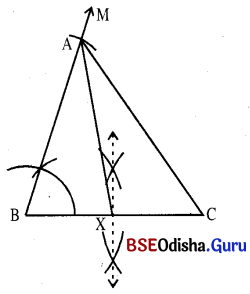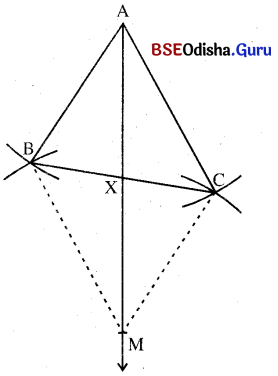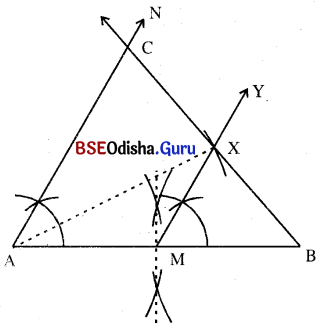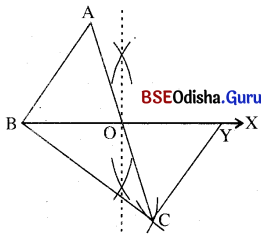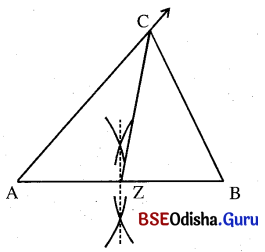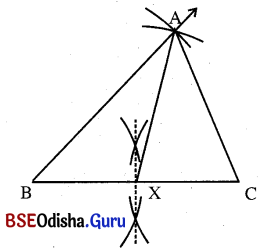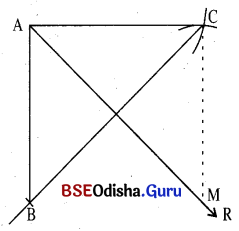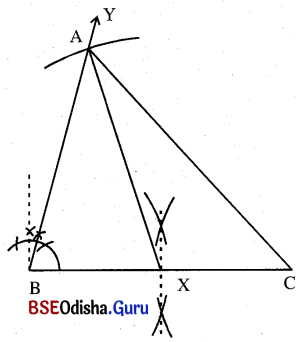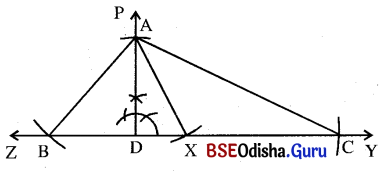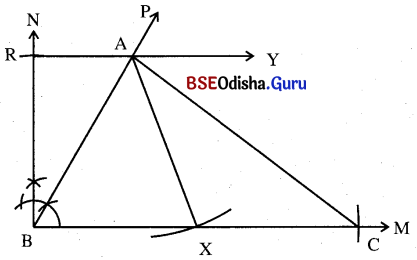Odisha State Board CHSE Odisha Class 12 Approaches to English Book 2 Solutions One-Act Plays Chapter 1 The Hour of Truth Textbook Exercise Questions and Answers.
CHSE Odisha 12th Class Alternative English Solutions One-Act Plays Chapter 1 The Hour of Truth
Section – 1
Questions For Discussion
Question 1.
How is the opening situation of the play introduced in the stage direction? What , mood or moods does it convey to you ?
Answer:
The opening situation of the play introduced in the stage direction is that it is a rather hot and sultry Sunday after-noon and the sun overhead and the baked clay under foot are merciless.’ In the distance lowing clouds give promise of coming relief. And at the parlour window of a trim little cottage and Baldwin family is anxiously awaiting the return of its head, John the young son of twenty seven smokes a pipe philosophically. Mother and Evie are there. The mood indicates that as if none of them likes to break the silence. The family has been waiting for the head of the family’s arrival with eagerness.
Question 2.
Who are the Baldwin family waiting for as the play begins? What traits of the persons character are they talking about?
Answer:
The Baldwin family comprises Robert Baldwin; Martha, his wife; John, his son and Evie his daughter. The family have been their father who doesn’t disclose before his children.
Question 3.
What do the newspapers think about Robert Baldwin’s role in the fall of Gresham’s Bank? How does Martha defend her husband? .
Answer:
The newspapers think that Robert Baldwin is responsible for the closure of Gresham’s bank. Martha defends her husband saying that her husband has been innocent.
Question 4.
How does John feel about his father naming him after John Gresham? What is his attitude towards his father?
Answer:
Robert Baldwin’s son is John whose name has been named after John Gresham. Mr. Baldwin’s witness will have to sent Gresham to goal. Punishing a person whose name is the same as his son. This punishment seems against Baldwin. He has a negative attitude towards his father.
![]()
Section – 2
Questions For Discussion
Question 1.
What does Baldwin say about Gresham had sent for him? What did Gresham propose to him? How did Baldwin respond to his proposal?
Answer:
Baldwin says that Gresham had sent for him for his personal interest. It was to persuade him to give his witness in his favour in connection with the misappropriation of money of the bank. He proposed him to say only three words. I don’t remember” which would help him a lot to be proved Mr. Clean, But Baldwin’s response to such unethical thing was negative. He never wished to help with immoral activities. He decided to tell the truth and send Gresham to goal
Question 2.
What truth does Baldwin throw on his relationship with Gresham? Would you say he sounds emotional? What does he say he would do if required to choose between friendship and personal integrity?
Answer:
Baldwin and Gresham were childhood friends. Gresham seems to be dishonest in misappropriating money. Baldwin is against such unethical mode of living. He told him several times to do good but to of not avail. Baldwin does not sound emotional. He gives priority to reason. If required, he would chose personal integrity between friendship and personal integrity.
Question 3.
Do you find a turning point in the attitude of the rest of the Baldwins towards Robert Baldwin’s honesty? What is it due to? What does it reveal about ordinary human nature? In what way is Robert extraordinary?
Answer:
The rest of the Baldwins other than Robert Baldwin value money and materialistic pursuits above everything else. Personal integrity is receded to the background and money is given up priority. They stress on receiving the large chunk of money from Gresham in exchange of an immoral expression comprising only three words. “I don’t remember” which Robert never stoops to utter. It is due to poverty. It reveals ordinary human nature as materialistic and futuristic. Robert happens to be extra – ordinary because he values personal integrity above anything else on earth.
Question 4.
How did Gresham react to Robert’s rejection of his offer to bribe to help him escape punishment? Why does Robert consider Gresham’s reaction a compliment?
Answer:
Grasham reacts to Robert’s rejection of his offer of bribe to help him escape punishment. Robert declines to tell a lie by Uttering the expression containing three words – “I don’t remember” which will help him liberate from unitive measures. As Grasham’s reaction is not over powering. Robert thinks there won’t be any problem of imposition.
![]()
Vocabulary
A. Say which parts of speech do the following belong to:
| hot | strength |
| sultry | swear |
| sun | nice |
| window | position |
| anxiously | witness |
| young | matter |
| philosophically | employees |
| nervousness | Father |
| tense | mother |
| loyal | doctor |
| think | engineer |
| pause | lecturer |
| know | expect |
| indict | shrug |
| testify | depositors |
| consolation | wonder |
| assistant | contradict |
| yesterday | under |
| idea | above |
| thought | |
| morning |
Answer:
| Words | Parts of Speech |
| hot | adjective |
| sultry | adjective |
| sun | noun |
| window | noun |
| anxiously | adverb |
| young | adjective |
| philosophically | adverb |
| nervousness | noun |
| tense | adjective |
| loyal | adjective |
| think | verb |
| pause | verb |
| know | noun / verb |
| indict | verb |
| testify | verb |
| consolation | noun |
| assistant | noun |
| yesterday | adverb |
| idea | noun |
| thought | noun |
| morning | noun |
| strength | noun |
| swear | verb |
| nice | adjective |
| position | noun |
| witness | noun/verb |
| matter | noun |
| employees | noun |
| lather | noun |
| mother | noun |
| doctor | noun |
| engineer | noun |
| lecturer | noun |
| expect | verb |
| shrug | verb |
| depositors | noun |
| wonder | noun/verb |
| contradict | verb |
| under | preposition |
| above | preposition |
![]()
Supply antonyms of the following:
| abolish | blame |
| abstract | bottom |
| abuse | brief |
| accord | brutal |
| accuse | busy |
| admit | capture |
| adopt | |
| adult | carnal |
| advance | cause |
| afar | casual |
| agree | cheerful |
| alone | civilise |
| apex | clever |
| arrive | common |
| attain | cool |
| attract | creation |
| away | cruel |
| back | dark |
| balance | day |
| base | debate |
| before | debit |
| begin | deep |
| benefit | defend |
| batter | deficit |
| big | delicate |
Answer:
| Words | Antonyms |
| abolish | introduce |
| abstract | concrete |
| abuse | reward |
| accord | discord |
| accuse | praise |
| admit | deny |
| adopt | abandon |
| adult | child |
| advance | retreat |
| afar | near |
| agree | disagree |
| alone | together |
| apex | low |
| arrive | depart |
| attain | give |
| attract | repel |
| away | near |
| back | forward |
| balance | imbalance |
| base | baseless |
| before | after |
| begin | end |
| benefit | loss |
| better | worse |
| big | small |
| blame | praise |
| bottom | up |
| brief | elaborate |
| brutal | human |
| busy | lazy |
| capture | liberate |
| carnal | spiritual |
| cause | effect |
| casual | regular |
| cheerful | dull |
| civilise | uncivilise |
| clever | stupid |
| common | uncommon |
| cool | warm |
| creation | destruction |
| cruel | kind |
| dark | light |
| day | night |
| debate | admit |
| debit | credit |
| deep | sallow |
| defend | offend |
| deficit | surplus |
| delicate | rough |
![]()
C. Use the following in sentence
| abuse | ban |
| account | bark |
| ache | base |
| act | beat |
| address | bend |
| advance | bite |
| aim | blame |
| answer | blow |
| arm | bomb |
| attempt | book |
| back | brush |
| balance | burn |
Answer:
Abuse:
(N) Your abuse have no impact on him.
(V) We should not abuse the poor.
Account:
(N) Make an account of the business of today.
(V) He has accounted the expenditure correctly.
Ache:
(N) Body ache spoils sleep.
(V) My head aches severely.
Act:
(N) This is an act of stupidity.
(V) You should act upon my advice.
Address:
(N) I require his address.
(V) The speaker addressed a large audience.
Advance:
(N) He asked for an advance.
(V) He had advanced a lot.
Aim:
(N) The aim of my life is to be a doctor.
(V) He aimed at the bird and shot successfully.
Answer:
(N) Your answer is correct.
(V) He answered the question correctly.
Arm:
(N) He did this by his arms.
(V) The soldiers are armed to the teeth.
Attempt:
(N) He has taken a good attempt.
(V) You should attempt for the second time.
Back:
(N) He has a boil on his back.
(V) My father backs me with money.
Balance:
(N) I have no balance in my account.
(V) She balanced the situation perfectly.
Ban:
(N) The government put ban on appointment.
(V) New appointments have been presently banned.
Bark:
(N) There is a dog. I never care for its bark.
(V) The dogs bark at night.
Base:
(N) He formed a base in this locality.
(V) The book is based on grammatical exercises.
Beat:
(N) The heart beat of healthy man is 72 times a minute.
(V) Don’t beat the child, it will be obstinate.
Bend:
(N) The bend of the road is sharp.
(V) This boy never bends in argument.
Bite:
(N) The woman died of a snake bite.
(V) His blame has no base.
Blame:
(N) You cannot blame me for this.
(V) His cap was blown away.
Blow
(N) Her father’s death came to her like a blow from the blue.
(V) His cap was blow away.
Bomb:
(N) This bomb can blow away the bridge.
(V) America bombed twice in Japan.
Book
(N) I want your book.
(V) He booked a ticket for me.
Brush:
(N) He bought a tooth brush.
(V) You should brush your teeth twice daily.
Bum:
(N) Apply ointment to the bum.
(V) We should not bum our forests.
![]()
section – 3
Questions For Discussion
Question 1.
Do you notice any change in John’s attitude towards corruption in general and Gresham in particular? What is it due to? What are his arguments in Gresham’s favour?
Answer:
There is a sea change in John’s attitude to corruption in general and Gresham in particular when he learns that a hundred thousand dollars has been offered to his lather. It is due to his unemployment and his father having been thrown out of the bank providing sustenances to the family was the prime need. He argues in Gresham’s favour by saying that “your testifying against John Gresham won’t make things any better.
Question 2.
What are the present view of Martha and Evie on the Gresham case? Would you call it a reversal in their earlier attitudes to Baldwin’s honesty? How?
Answer:
Martha and Evie veer round in their views and attitudes. They change their attitude which can be temied a neversal in their earlier attitudes to Baldwin’s honesty. Martha, and Evie were initially with Baldwin’s sense of honesty. Martha said, “…I don’t believe your lather ever did a wrong thing in this life – not if he know it was wrong”. “How dared he (Gresham) ask such a thing” and Evie supported.
But when they learn that Gresham has offered a hundred thousand dollars to make Baldwin say “I don’t remember” to save himself from going to gaol, they feel tempted and change their attitudes. Evie says, “Why do you call it bribe money father.-. .. “And Gresham hasn’t done anything really wrong”. Martha says, “A hundred thousand would mean a great deal to us. Robert. If you don’t find a position soon John will have to support us.”
Question 3.
How does Baldwin react on being impelled by the members of his family to accept the bride offered by Gresham? (Paragraph – 255)
Answer:
When there is pressure from all quarter of his family on Baldwin, he feels like a fish out of water. His son John tells him that nobody will ever hear of Baldwin’s getting money from Gresham. Robert has a reaction. He says “But among ourselves John, whatever we are to the world, let us be honest with each other, the four of us.” His glance travels from John to Evie whose head is bowed from her to his wife who is apparently busy with her knitting. He raises Martha’s head and shouts. “Shams! Liars! Hypocrites! Thieves! And I know better than any of you.
Question 4.
How is Baldwin rewarded at the end for his unfailing honesty? In what does Gresham pay him his ‘supreme compliment’? (Paragraph – 279). What makes Baldwin worry at the end?
Answer:
Truth always triumphs. Baldwin is rewarded at the end for his unfailing honesty Mr. Marshall appears at Baldwin’s house and gives him the supreme compliment. He had been to Gresham. He told Marshall about the offer he made to Baldwin. He knew that no amount of money wouki make him do something he thought wrong. He paid Baldwin the supreme compliment rather than go to trial him to testify against him he confessed.
![]()
Composition
Question 1.
What do you think is the hour of truth? How does Robert Baldwin stand the hour?
Answer:
The one-act play “The Hour of Truth” is undoubtedly the most typical creation of Percival Wilde, an eminent and outstanding American short story writer, writer of mystery novels and plays. The way the writer has dealt corruption and honesty in the play is superb and fantastic. Wilde is, in feet, at his best to justify himself as a prominent writer in this play. However, “The Hour of Truth” is powerful one act play on the corrupting influence of money of people.
The play advocates a message that the truth always triumphs at last. Whatever be the opposing forces, truth always prevails over everything. A worshipper of truth although suffers through his life’s course avails himself of a sensational victory over the evil. Evil may have an upper hand for a short time, but the final victory brings a unique moment of pleasure through purgation. The hour of truth is always the last. Robert Baldwin, the protagonist figure of the play suffers for truth which ultimately makes him win.
However, Robert Baldwin resorts oftruthful persuits of live. He values truth other everything else. Gresham is charged with misappropriating money of which Baldwin remains and eyewitness. He promises Baldwin a hundred thousand dollars to help him escape from punishment. But Robert is dead against such terrible corruption. He does not receive the bribed money and remains in a state of trance and tension Gresham requests him to speak only three words “I don’t remember” which will be enough to help escape punishment.
But Baldwin declines to accept the offer and decides to witness against his childhood friend Gresham. Moreover, he comes back home where his wife and children seem to be in favour of his stand. But when the plot advances, his family veer round and change themselves in favour of bribe and Gresham. The huge amount of covetousness, materialistic desires impel them to pressurise. Mr. Baldwin to accept the money in exchange of one hundred thousand dollars.
They agree with Baldwin to accept the bribe which will help John to do something for the family. His wife Martha and daughter Evie support John in his stand. He has no other alternative except Succumbing. He feels like a fish out of water. In the mean time, Mr. Marshall arrives and declares that Gresham already confessed the matter and he has come to request Baldwin to join the Third National as a token of reward for his honesty. A matter of feet, the above mentioned description tells us that virtue is rewarded at last.
We have marked that Robert Baldwin is victorious in the long run. Hence, Wilde’s exposition of honesty, virtue, truth etc. through the play is superb and fantastic. The depiction that despite of all hazards and obstacles, the truth becomes the winner at last is really most inspiring, thought provoking elevating and heart touching.
Question 2.
Contrast the early and later attitudes of the Baldwin family towards corruption. What brings about the shift in their attitudes?
Answer:
In fact, the one – act play, “The Hour of Truth” is a superb creation of Percival Wilde, aprominent, popular and outstanding American play wright. Wild’s writing most probably deals with positive attitudes which on the course of time crash with negative attitudes but on the long run, the positive attitudes like, truth, honesty, virtue etc. becomes triumphant over all the negative attitudes. These two opposite poles of life are vehemently contrasted in this discussing play.
However, the early and later attitudes of the Baldwin family to wards corruption are sharply contrasted. The one – act play “The Hour of Truth” presents these two attitudes by means of which the play wright tries to evince his testimony. Initially Martha says to John that Baldwin will do his duty no matter what comes of it. Baldwin has nothing against Gresham. He will tell the truth, nothing but the truth. When she comes to know from Baldwin that gresham has offered bribe to her husband to tell lies.
She reacts saying “How dared he how dared he asked such a thing. ‘The same person changes her Jargon when she learns that Gresham has offered Baldwin a huge sum of one hundred thousand dollars. The tempts for money becomes very powerful in her. She says, “It would be sad very sad if the name of John Gresham our son’s name should come to grief through you, Robert”. “…………………. They will say you went back on an old friend Robert”. “I believe say being merciful Robert”. “………………….. Mr. Gresham has always been very good to you. Ah, well! What are you going to do now; Robert?” “ ……………………………. A hundred thousand would mean a great deal to us, Robert.
If you don’t find a position soon. John will have to support us.” Moreover, Evie was initially against Gresham’s activities but her attitudes later on are contrasted. Evie also becomes a part of the system and supports her brother and mother later on. Thus, it is seen that the characters are round characters who under go changes according to the changing situations. In fact, Wide’s depiction of the contrasting characters in the play is outstanding and marvellous. He, though these characters times to expose realistic homely situation which is really inspiring attractive, daring and heart enduring.
![]()
Grammar
Add question tags to following:
1. He leaves for London tomorrow.
2. They are looking for a tutor.
3. You speak English well.
4. This man deals in wheat.
5. Pen is mighter than sword.
6. She never comes here.
7. The boy seldom does his homework.
8. Vijay plays well.
9. Come here.
10. Go there.
11. Transfer the salt please.
12. Speak the truth.
13. Let us sing a song.
14. Let us find out a solution.
15. We have been staying here.
Answer:
I. He leaves for London tomorrow, doesn’t he?
2. They are looking for a tutor, aren’t they?
3. You speak English well, don’t they?
4. This man deals in wheat, doesn’t they?
5. Pen is mighter than sword, isn’t it?
6. She never comes here, does he?
7. The boy seldom does his homework, does he?
8. Vijay plays well, doesn’t he?
9. Come here, will you?
10. Go there, will you?
11. Transfer the salt please, will you?
12. Speak the truth, will you?
13. Let us sing a song, shall we?
14. Let us find out a solution, shall we?
15. We have been staying here, haven’t we?
![]()
Vocabulary
Use the following in sentences of your own first as nouns and then as verbs.
| plough | skin |
| poison | slap |
| post | slaughter |
| present | sleep |
| progress | smile |
| race | smell |
| rain | smoke |
| reach | soap |
| replay | sound |
| rest | stage |
| ride | stand |
| rule | start |
| ruin | step |
| set | study |
| share | tax |
| shave | taste |
| shop | thunder |
| shout | touch |
| show | trouble |
| sigh |
Answer:
plough:
(N) He tills the land with a wooden plough
(V) The farmer has ploughed the land.
poison:
(N) Poison killed him.
(V) The woman poisoned her husband’s mind.
post:
(N) His post is temporary.
(V) Post the letter now.
present:
(N) She received a present from his uncle.
(V) He presented me a radio on my birthday.
progress:
(N) His progress is very slow.
(V) He has progressed a lot.
race:
(N) He won a hundred meter race.
(V) He raced in the competition.
rain:
(N) The rain of this year is not enough.
(V) It rains high in July.
reach:
(N) The matter is not within my reach.
(V) You should reach the meeting in time.
reply:
(N) I want an immediate reply from you.
(V) He replied promptly.
rest:
(N) He works without rest.
(V) Success rests in labour.
ride:
(N) He goes on a ride in the evening.
(V) He rode past the house.
rule:
(N) A student must obey the rules of the college.
(V) Akbar ruled for a long time.
min:
(N) The house is in ruins.
(V) He ruined his career.
set:
(N) He bought a television set.
(V) You should set a thief to catch the thief.
share:
(N) I want my share today.
(V) The two brothers share their property.
shave:
(N) He has a shave this morning.
(V) He has shaved his beard.
shop:
(N) This shop deals in vegetables.
(V) We shop every Sunday.
shout:
(N) His shout troubled me.
(V) He shouted loudly.
show:
(N) Let us visit the first show of this cinema.
(V) Don’t show your anger.
sigh:
(N) He heaved a sigh of relief.
(V) You should not sigh inside the class.
skin:
(N) Her skin is oily.
(V) She skinned off the vegetables.
slap:
(N) She gave a slap on the boy’s face.
(V) The boy slapped the man.
slaughter:
(N) Slaughter of cows should be stopped.
(V) he slaughters animals.
sleep:
(N) I had a sound sleep.
(V) I want to sleep now.
smile:
(N) Her smile is alluring.
(V) Don’t smile at her.
smell:
(N) The smell is very sweet.
(V) This flower smells sweet.
smoke:
(N) All his efforts ended in smoke,
(V) Don’t smoke cigarette.
soap:
(N) This soap is good for skin.
(V) She soaps her body too much.
sound:
(N) Light travels fester then sound.
(V) Empty vessel sounds much.
![]()
stage:
(N) The stage is well decorated.
(V) They staged a drama.
stand:
(N) You should keep your cycle in the stand.
(V) He stands first in the class.
start:
(N) He has a good start.
(V) He started a new business.
step:
(N) You should climb up the steps carefully.
(V) He stepped forward successfully.
study:
(N) He went for higher study.
(V) You should study everyday in time.
tax:
(N) I have paid my income tax.
(V) The government taxes the people heavily.
taste:
(N) The taste of the Suit is sweet.
(V) Quinine tastes bitter.
thunder:
(N) The thunder was dangerous.
(V) The lady thundered into my room.
touch:
(N) The touch is terrible.
(V) Don’t touch me.
trouble:
(N) He has faced a lot of troubles.
(V) He troubled me at school
twitter:
(N) Have you hear a bird twitter?
(V) The birds twitter in the tree.
The Hour of Truth Summary in English
Section – 1
Pre – reading Activity:
1. There is a saying, ’’Honesty is its own reward”. Honesty is the lack of opportunity” goes another saying. What would you say so that ?
2. What does the title “The Hour ofTruth” suggest to you? Can you guess from the title what the play may be about?
Focusing Questions:
As you read the play, ask yourself:
What is the true test of one’s honesty and truthfulness ?
How would you tell the truly honest from the seemingly honest persons ?
Introducing the writer:
Percival Wilde (Bom 1887) is a popular American writer of short stories, mystery novels and plays. “The Hour ofTruth”, a powerful one-act play on the corrupting influence of money on people is taken from a volume ofhis short plays title “A Question of Morality and other plays”.
Characters:
Robert Baldwin Martha, his wife John, his son Evil, his daughter Mrs. Marshall
![]()
GIST:
Paragraphs: 1-3
It is a rather hot and sultry Sunday after – noon and the sun overhead and the baked clay under foot are merciless. In the distance, lowering clouds give promise of coming relief. And at the parlour window of a trim cottage the Baldwin family is anxiously awaiting the return of its head. John, the son an average young man of twenty seven is smoking a pipe as philosophically as if this day were no while more momentous that any other.
But his mother had made little progress in the last half-hour and Evil, his sister, take no pains to conceal her nervousness. There is a tense pause. It seems as if none of them liked to break the silence. For the tenth time in ten minutes. Evil goes to the window and looks out along the sultry road.
GIST:
Paragraphs: 4-20
Martha opens the dialogue saying that it is time he was home. Evil affirms to it. Martha again says that the hopes he has forgotten his umbrella which he always does. It is likely to rain. Without waiting for any answer, she goes to the window and looks out anxiously. The sky is dark, there is a flash of lightening. John rises slowly. He moves to a centre table and knocks the ashes out of his pipe. His mother shouts to John to run into his fathers room and see that the windows are closed.
Evil asks her mother of Mr. Gresham, has done anything wrong. He has been arrested and will be tried the next day. Evil enquires why he is in need of father. Her mother replies that it is because father will have to give evidence. Evil says that her father is going to give evidence against Mr. Gresham, why then does he want to see father. Mother says she does not know anything about the matter as father doesn’t say much about his business aflairs.The matter is about the wrecking of the bank.
GIST:
Paragraphs: 21-53
The bankers have not been fair to him because he has been working under Gresham’s orders Martha says that her husband has ever done any wrong in life. John enters through the discussion. Martha asks if the windows were open. He says he has closed them. He asks what has Mr. Gresham have to do with father. Martha replies she doesn’t know. Asked whether she has asked him about it, she says she has but he has never replied. John says that he has asked the assistant cashier the day before he says that nobody has any idea that there was anything wrong until the crash came.
Donovan, the assistant cashier had been there for eight years. He thought he was taken care of for the rest of his life. He had got married on the strength of it. One morning there was a sign up on the door and it was like a bolt out of a clear sky. Father was closer to Gresham than any one else. That puts him in a nice-position. John says that father is the only witness against John Gresham. He says and will say the only truth.
![]()
Analytical Outlines
- It is a rather hot and sultry Sunday after-noon.
- The sun is everhead.
- The baked clay under fort are merciless. .
- In the distance, lowering clouds give promise of coming relief
- The Baldwin family lives in a trim little cottage.
- It is at the parlour window.
- The family is anxiously awaiting the return of its head.
- John is the son of Robert Baldwin.
- He is an average young man.
- He is twenty seven.
- He is smoking a pipe.
- He is doing it philosophically.
- As if this day were no while more momentous that any other.
- But his mother has made little programme in the 1st half hour.
- Evil is his sister.
- She takes no pains to cancel her nervousness.
- There is a tense pause.
- It seems as if none of them likes to break the silence.
- It is for the tenth time in ten minutes.
- Evil goes to the window.
- She looks out long the sultry road.
- Martha opens the dialogue.
- She says that it is time he was home.
- Evie affirms to it.
- Martha says he has forgotten his umbrella.
- He always forgets his umbrella.
- It is likely to rain.
- She goes to the window.
- She looks anxiously.
- The sky is dark.
- There is a flash of lightening.
- John rises slowly.
- He moves to a centre table.
- He knocks the ashes out of his pipe.
- His mother turns to him.
- Mother shouts to John to run into his father’s room.
- She tells him to see that the windows are closed.
- Evie asks her mother if Mr. Gresham has done anything wrong.
- He has been arrested.
- He will be tried the next day.
- Evie enquires why he is need of father.
- Her mother replies about the reason.
- His father will have to give evidence.
- Evie says that her father is going to give evidence against Mr. Gresham
- Why than does he want to see father?
- Mother says she does not know anything about it.
- The mother does not say much about his business affairs.
- The matter is about the wrecking of the bank.
- The bankers, have not been fair to him.
- Because he has been working under Gresham’s orders.
- Martha says that her husband her ever done any wrong on life.
- John enters through in the discussion.
- Martha asks if the windows were open.
- He says he has closed them.
- He asks what has Mr. Gresham have to do with father.
- Martha replies she doesn’t know.
- He asks what has Mr. Gresham have to do with father.
- She replies positively.
- But he has never replied anything.
- John says that nobody has any idea about it.
- He says that nobody has any idea about it.
- Actually, there was anything wrong.
- Donovan, the assistant cashier had been there for eight years.
- He thought he was taken care of for the rest of his life.
- He had got married on the strength of it.
- One morning, there was a sign up on the door.
- It was like a bolt out of a clear sky.
- Father was closer to Gresham than any one else.
- That puts him in a nice position.
- John says that father is the only witness against Mr. Gresham.
- He says he will say the only truth.
![]()
Meaning Of Difficult Words
Sultry – hot and oppressive
momentous – very important
wrecking – ruin, collapse
indicated – accused officially, or legally a bolt out of
the clear sky – a quite unexpected danger
governor – (informal) father
pegging along – doing a work determinedly
reward – prize, gift
merciless – unkind, cruel, unsympathetic
anxiously – eagerly worriedly
coceal – hidden
pause – halt, coming to a standstill
nod – move ones’ head to consent or deny
evidence – proof, substantial document to prove something
conteirçtuously – hatefull,ç derisively
ratbertimidly – ratherlikeacoward
make for the door – go about quickly to the door.
Section – II
Gist:
Paragraphs: 54-77
John, Mr. Baldwin and Martha enter. Evie also comes. John asks his father that it is time he told something to them. John says that people have been talking about his father a lot. His father interrogates what it is. John says it is all rotten which cannot be contradicted. Baldwin asks the reason why and John replies it is because he does not know anything about what people talk about Baldwin asks if he does not know his father. Baldwin says the he has told Mr. Gresham to make good and even the best he can and the first step is to close the bank.
which he did not want do to. Martha says that he has done that. Baldwin replies he has made him do it, meanwhile. Baldwin says all will be clear the next day. The trial begins in twenty four hours. He is the only witness against him. John seving his skin wants him to perjure himself Baldwin says that it will not be he tells all what he knows John Gresham will go to gaol. No power on earth can save him from it. But he wants Baldwin to forget the essential things when questioned. Baldwin has to say that he does not remember which escape punishment.
Gist:
Paragraphs 78-90
John says it will be a lie. Martha quivers in indignation and says how does he says such a thing. Evie asks what her father has said Baldwin interrogates what John should have said in this context. He says that he should have told him to go to the devil. Baldwin says he has not said such words because he is too old a friend of his to tell such things.
Evie asks what Gresham he replied to her father, Gresham is not surprised to have heard this. “Had it been any body else”, says Baldwin. “ I would have stuck him across the free.” But Gresham and he were boys together. They worked side by side. He is desperate have offered him money. John gets angry and says he has offered money.
Gist:
Paragraphs: 91-135
Baldwin and Gresham have worked together. He has been loyal to him but when Gresham ceases to be an honest man, he wishes to part company. He wants to go to, his grave clean. He rises and goes to the window and looks out. John asks what Gresham has offered him for that. Baldwin says that it is hundred thousand dollars.
He put aside Baldwin without anybody knowing it. It is out of his private fortune; it is not the depositors money John and Evie express surprise at such money Gresham unlocked a drawer and showed him the money. John asks whether it is in cash. It is in a thousand dollar bills which he evamined to be genuine.
Gist:
Paragraphs: 111-120
Evie says slowly that he assures to give such a huge amount only to say, “I don’t remember” only for three words.” John says that he won’t have done that. These three words would have chocked him he tried to speak them, which for some other man would have been easy. When Gresham offered him money Baldwin was angty, but when he rejected ifthe former did not show any surprise. It was perhaps a compliments. John says it is an expensive compliment. It is a compliment which costs a hundred thousand dollars. He hasn’t ever had so much money in his life to spend says Baldwin.
![]()
Analytical Outlines
- John, Mr. Baldwin and Martha enter.
- Evie also comes
- John asks his father to tell them something.
- It is the proper time to tell that.
- John says that people have been talking about him a lot.
- His father interrogates what it is.
- John says it is all rotten.
- It cannot be contradicted.
- Baldwin wants to know the reason.
- John says that he does not know about it.
- He does not know what the people talk about.
- Baldwin asks if he does not know his father.
- Baldwin says that he has told Mr. Gresham to make the best he can.
- The first step is to close the bank.
- But he did not want to do that.
- Martha says that he has done that.
- Baldwin replies he has made him to it.
- He was angry.
- Evil tells that the papers do not say that.
- Baldwin replies it is not necessary to tell them.
- Martha says that he let his name rest under a cloud mean while.
- Baldwin says all will be clear the next day.
- The trial begins.
- John indignantly says something then.
- He wants his father lie for saving his skin.
- He wants him to perjure himself.
- Baldwin says that it will be not necessary.
- If Baldwin says what he know.
- Then Gresham will certainly go to gaol.
- No power on earth can save him from it.
- But he wants Baldwin to forget the essential things
- He will do it when questioned.
- Baldwin has to say that he does not remember.
- So that it cannot be proved.
- It will help Gresham escape punishment.
- John says it will be a lie.
- Martha quivers in indignation.
- She says how dares he says such a thing.
- Evie asks what her father has said.
- Baldwin interrogates what John should have said in this context.
- He says that he should have to tell him to go to the devil.
- Baldwin says he has not said such words.
- Because he is too old a friend of his to tell such things.
- Evie asks what Gresham has replied to her father.
- “Had it been anybody else” says Baldwin “ I would have struck him across the free”.
- But Gresham and he were boys together.
- They worked side by side.
- He is desperate.
- He doesn’t know what he is doing.
- Or he wouldn’t have offered him money.
- John gets angry.
- He says he has offered money.
- Baldwin and Gresham have worked together.
- He has been loyal to him.
- But Gresham ceases to go to his grave clean.
- He rises and goes to the window and looks out.
- John asks what Gresham has offered him for that.
- Baldwin says that it is a hundred thousand dollar.
- He puts aside Baldwin without any body knowing it.
- It is out of his private fortune.
- It is not the depositor’s money.
- John and Evie express surprise at such money.
- Gresham unlocked a drawer.
- He showed him the money.
- John asks whether it is in cash.
- It is in a thousand dollar bills.
- He examined it to be genuine.
- Evie says about it slowly.
- She says that he assures to give such a large amount.
- It is only to say, “I don’t remember”.
- She exchanged that it was only for those three words.
- John says that he won’t have done that.
- Those three words would have chocked him.
- He tried to speak them.
- For some other man would have been easy.
- Baldwin became angry by that offer.
- But he rejected this offer.
- Gresham didn’t show any surprise.
- It was perhaps a compliment.
- John says it is an expensive compliment.
- It is a compliment costing hundred thousand dollars.
- Baldwin says that he hasn’t ever had so much money in his life to spend.
![]()
Meaning Of Difficult Words
smashup – crash
make good – repair the damage .
under a cloud – under a suspicion
peijure – lie underoath
whiphad – control
Bully for you, Dad – John does not think that what his fàther has done is a great achievement or something very exciting.
mincing matter – cover up an unpleasant statement in delicate or nice words.
heggle – argue, bargain
third national – Third National Bank supervising and controlling private Bank in America.
contradict – say something contrary to what has been said before.
intently – with considerable concentration.
quivering – shaking, shuddering, trembling
indignation – excessive anger and exasperation
furious – very angry and violent
hypnotised – mermarized, under a great spell
annzement – astonishment, surprise, wonder
emphatically – with considerable stress or emphasis
internipting – interfering; intervening
insistently – giving stress, repeatedly
Section – III
Pre-reading Activity:
In Section -1, we gather the discussion among Robert Baldwin’s wife, son and daughter about his unflinching commitment to honesty which they are all so proud of.
In Section – II, Baldwin gives a good account of him self in rejecting Gresham’s offer of a huge amount of money as bride in return for a safe lie in his favour.
So what do you think is going to happen next?
Do you think:
(a) The members of Baldwin’s Bank family will support his action.
(b) Baldwin will succumb to temptation and accept and accept the bride on second thought.
(c) Baldwin will be rewarded for his honesty. Now, read on and see which ofyour guess isright.
Gist:
Paragraphs: 136 -160
John says that Gresham is perhaps going to be punished and his father says, “Yes”. He asks what the reason for his being punished. He replies it is his misappropriating money. John says he knows that and asks what crime he has made. Baldwin says that it is a crime. John says that nobody is less by it and he is going to be punished for this petty matter. John and Evie imitate their father for becoming ready to give witness against Gresham, in the court. Baldwin gets puzzled. John says that it will be a nasty place if Gresham is put on goal with his son named after him (His son’s and Gresham’s name is John).
Gist:
Paragraphs: 161 -190
Martha asks her husband what he is going to do for Gresham the next day. Baldwin replies that he is going to say the three words “I don’t remember” It does not seem right to send an old friend to gab says Martha. It will be sad very sad if the name of John Gresham (their son’s name) should come to grief through her husband Mr. Baldwin says Martha and her children. Baldwin retorts that they were telling him to accept bribe then. Evie says why father should consider it as bribe money.
Gist:
Paragraphs: 191 – 230
Baldwin says that a hundred thousand represents no difference between what he had paid him and what he had actually been worth to him Evie says if John Gresham is put to jail, what will people say, Baldwin says he will reply that he has done his duty. Evie says that same people call him a traitor to his friend. She also says that when they find out that they have not lost any money when John Gresham tells them that he will pay back every cent then they won’t want him to go gaol. Baldwin says he believes so.
John says that they won’t feel too kindly disposed towards the man who will say that Robert Baldwin has gone back on his old friend. Evie says that Gresham has not done anything wrong. John is an opinion that its a technique is what it is nobody loses a cent and nobody wants to see him punished except father. John attacks his father’s morality saying that he is going to send a man to gaol whose name his son’s name has been given. Martha says that Robert should be rather merciful. Mr. Gresham has always been good to him. Baldwin has been out of work since the bank closed. Baldwin says he will have to get another job.
But Martha says how he will be able to get it such an age. Baldwin replies that it is man which is important not age. Martha taunts him saying that he has said it. John says he has heart it from Donovan he has gone with the Third National and they would not take Baldwin on there. Baldwin tells that their staff is full and he won’t be taken on even as a clerk John informs that Mr. Marshall says he won’t employ a man who is just as guilty as John Gresham.
Gist:
Paragraphs: 231 – 260
Baldwin says that he is not at all guilty. John retorts who will believe it. He will find that against himself wherever he goes. His testifying against John Gresham won’t make thing better, if Baldwin ever gets a job, it will be with Gresham. This is a starting idea to Baldwin who shows his surprise. If Gresham doesn’t go to gaol, he will start in business again and he can’t offer him (Baldwin) anything less than a partnership which can be made with the hundred thousand capital.
John continues, not only that, he will owe him (Baldwin) quite a debt of gratitude. Martha says that a hundred thousand will mean a great deal to their family. If he foils to find him a job, John will have to support without John expresses awe and says not to bother for him. Baldwin gets disturbed and shouts “you want me to take this money”. He asks at least one of them must say either ‘yes’ or ‘no’ and he declares that he won’t enter into any partnership with gresham John replies that he should then go into partnership with another and this also needs money for which a hundred thousand is not a small sum.
However, Baldwin is confused and mentally disturbed. He tells himself if he takes tjie money he does a dishonourable thing. He said to John that they four at least should be honest with one another. His glance travels from John to Evie whose head as bowed; from her to his wife who is apparently busy knitting. He raises Martha’s head and looks into her eyes. Martha says that it is not wrong. John repeats the same sum of money.
Gist:
Paragraphs: 261 – 282
John says why Baldwin has refused the money. Whether it has been lost we should say something unfair about it. Baldwin says positively. John assures that nobody except the four will ever know it. John sees someonr coming and says it looks like Mr. Marshall. The door bell rings. He goes to a window commanding a view of the door way. Evie goes to open the door. Martha wins Mr. Baldwin to be careful of what he says Mr. Marshall enters the house buoyantly.
He shakes hand with Mrs. Baldwin and talks to them. Mrs. Baldwin and Evie leave Mr. Marshall says to Mr. Baldwin not to go on his account. He declares if Mr. Baldwin feels like coming around to the Third National sometime that week, he will find a position waiting for him. Baldwin was thunder struck at the news. Mr. Marshall says seriously that he has been to see Gresham that afternoon. Gresham tells him about the offer he has made to Baldwin.
But he has known that no amount of money will make Baldwin do something he thought wrong. He had paid Baldwin the supreme compliment rather than go to trial with him to testify against him, he has made he has confused, Baldwin sinks into a chair and gets astonished at Gresham’s confusion. Marshall says that he has said the whole story Martha seizing his hand piteously says “Cant’ you see his crying”?
![]()
Analytical Outlines
- John says that Gresham is perhaps, going to be punished.
- His father says positively.
- He asks what the reason of his being punished us.
- He replies it is his misappropriating money.
- John says he knows that.
- He asks what crime he has made.
- Baldwin says that it is a crime.
- John says that nobody loss by it.
- He is going to be punished for this petty matter.
- John and Evie irritate their father.
- Because their father is ready to give witness against Gresham on the court.
- Baldwin gets puzzled.
- John says that it will be nasty place.
- Gresham will be put in gaol with his son.
- Martha asks her husband what he is going to do for Gresham the next day.
- Baldwin replies that he is going to say the three words.
- It is “I don’t remember”.
- It does not seem right to send an old friend to gaol says Martha.
- It will be sad very sad if the name of John Gresham should come to grief through her husband.
- Mr. Baldwin says that Martha and his children retorts that they are telling him to accept bribe then.
- Evie says why father should consider it is bride money.
- Baldwin says that a hundred thousand represents no difference between what he had paid him
- What he had actually been worth to him.
- Evie says if John Gresham is put to gaol what will people say.
- Baldwin says he will reply that he has done his duty.
- Evie says that some people call him a traitor to his friend.
- She also says when they find out that they have not any money.
- When John Gresham tells them.that he will pay back every out them
- They won’t want him to go to gaol.
- Baldwin says he believes so.
- John says that they won’t feel too kindly disposed towards the man.
- It is for the man who helps to put him in gaol.
- Martha says that they will say the Robert Baldwin has gone back on his old friend.
- Evie says that Gresham has not done anything wrong.
- John is ofthe opinion that it is a technicality.
- Nobody loses a cent.
- Nobody wants his father’s morality.
- But they say that he is going to send a man to gaol.
- He is going to send a man after whose name his son’s name has been given.
- Martha says that Robert should be rather merciful.
- Mr. Gresham has always been good to him.
- Baldwin has been out of work since the bank closed.
- Baldwin says he will have to get another job.
- But Martha says how he will be able to get it at such an age.
- Baldwin replies that it is man which is important not age.
- Martha taunts him saying that he has said it.
- John says he has heard it from Donovan.
- He has gone with the Third national.
- They would not take Baldwin on there.
- Baldwin tells that their staff is full.
- He won’t be taken as even as a clerk.
- John informs that Mr. Marshall says he would not employ a man like him
- He is just as guilty as John Gresham
- Baldwin says he is not at all guilty.
- John retorts who will believe it.
- He will find that against himselfwherever he goes.
- His testifying against John Gresham won’t make things better.
- It Baldwin even gets a job, it will be with gresham
- This is a starting idea to Baldwin.
- If Gresham doesn’t go it gaol, he will start in business again.
- He only offers Baldwin a partnership of hundred thousand capital.
- John continues that he will also own his father quite a debt of gratitude.
- Martha says that a hundred thousand will mean a great deal to their family.
- If he fails to find him a job, John will have to support with that.
- So, John expresses awe.
- He says not to bother for him.
- Baldwin is confused.
- He is mentally disturbed.
- He tells himself that if he takes the money.
- He does a dishonourable thing.
- He said John that they four at least should be honest with one another.
- His glance travels from John to Evie.
- Her head is bowed.
- His wife is busy in knitting.
- He raises her head and looks into her eyes.
- Martha says that it is not wrong.
- Johnrepeats the same sumofmoney.
- John said why Baldwin has refused the money.
- Whether it has been lost we should say something unfair about it.
- Baldwin says positively.
- John assures that nobody except the four will ever know it.
- John sees someone coming.
- He says it looks like Mr. Marshall.
- The door bell rings.
- He goes to a window commanding a view of the door way.
- Evie goes to open the door.
- Martha warns her husband to be careful about his talking.
- Mr. Marshall enters the house buoyantly.
- He shakes hand with Mrs. Baldwin.
- Mrs. Baldwin and Evie leave the room.
- Mr. Marshall says to Mr. Baldwin not to go to his account.
- He declares ifMr. Baldwin feels like coming around to the ThirdNational sometime that week,
- He will find a position waiting for him.
- Baldwin was thunder struck at the news.
- Mr. Marshall says seriously that he has been to see Gresham that afternoon.
- Gresham tells him about the offer he has made to Baldwin.
- But he has known something.
- No amount of money will make Baldwin to something he thought wrong.
- He has paid Baldwin the supreme compliment.
- Rather than go to trial with him to testify against him he has made, he has confessed.
- Baldwin sinks into a chair.
- He gets astonished at Gresham’s confession.
- Marshall says that he has said the whole story.
- Martha seizes his hand piteously.
- She says, “Can’t you see he’s crying?”

